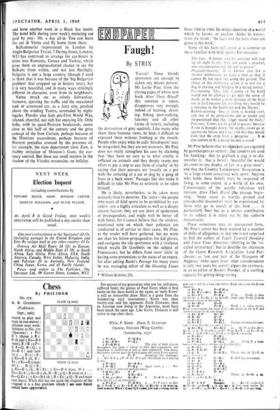NNPPLAPIU
Faugh!
By STRIX
TAUGH ! These bloody sportsmen are enough to sicken any decent person.' Mr Leslie Pine, from the closing pages of whose new book After Their Blood* this sentence is taken, disapproves very strongly indeed of hunting, shoot- ing, fishing, deer-stalking, falconry and all other forms of venery, including the destruction of grey squirrels. Like many who share these humane views, he finds it difficult to expound them without frothing at the mouth. People who enjoy what he calls `bloodsports' may be misguided, but they are not monsters; Mr Pine does not really strengthen his case by claiming that 'they have no care as to what cruelty is inflicted on animals and they deeply resent any effort to put a stop to any form of cruelty' or by saying that their pursuits are 'exactly on a par with the torturing of a cat or dog by a gang of louts in a back street.' Passages like this make it difficult to take Mr Pine as seriously as he takes himself.
He is likely, nevertheless, to be taken more seriously than be deserves. The 'antis'—the people who want all field sports to be prohibited by our rulers—are a highly articulate as well as a deeply sincere faction; they are not short of spokesmen or propagandists, and might well be better off with fewer, for I cannot believe that the strident, emotional note on which their polemics are conducted is of service to their cause. Mr Pine, as the reader will have gathered, has no more use than his fellow-propagandists for kid gloves, and castigates the vile sportsmen with a virulence which recalls Dr Goebbels on the subject of Freemasons; but he differs from most 'antis' in having some pretensions to the status of an expert, for after editing Burke's Peerage for many years he was managing editor of the Shooting Times * William Kimber, 25s. from 1960 to 1964. He writes therefore of a world which he knows, or anyhow thinks he knows, from the inside: 'the facts and the facts alone are -given in this book.'
Some of his facts will come as a surprise to those familiar with field sports. For instance: The Law. 'A keeper and his assistant will stay up all night if only they can catch a poacher, who on conviction w ill be sent to prison.'
Pheasant-shooting. 'It is known also for a shooter deliberately to wing a bird so that it cannot fly but must run along the ground. The object of this deliberate action is to test out a dog in chasing and bringing in a strong runner.' Fox-hunting. 'They [the majority of the field) would not be allowed to got near the scene of death, or be within a short distance of the final run in [sic] because for one thing they would be a nuisance to the huntsmen and the Master.' Rabbit-shooting. 'One of them is bowled over, and two of its companions are so tender and inexperienced that they linger round the body.' Falconry. 'Crows are no good as quarry, because if one is brought down, the nearby crows go in against the falcon and I was told that they would even tear the crop from a peregrine . . . It is also useless to fly a peregrine into a wood' Mr Pine believes that woodpeckers are regarded by gamekeepers as vermin: that condors are used for hawking: that to gralloch a stag is to dis- member it: that a ferret's 'beautiful fur would do credit to any display of furs in a great store': and that the Country Landowners' Association is `to a large extent concerned with sport.' Anyone who holds these beliefs must be suspected of living, to some extent, in a world of his own. Connoisseurs of the quietly ridiculous will treasure After Their Blood (the passage begin- ning: 'Snipe occur in marshy ground and considerable discomfort must be experienced by those who go in search of this bird . . ' is particularly fine) but as a serious contribution to its subject it is ruled out by the author's inaccuracies.
These sometimes take an unexpected form. Mr Pine's career has been marked by a number of shifts of allegiance, so that one is not surprised to find the author of Teach Yourself Heraldry and Trace Your Ancestors referring to the 'so- called aristocracy'; but to describe the chairman of the Game Research Association, Lord Por- chester, as 'son and heir of the Marquess of Anglesey' (who apart from other considerations is only two years his senior) argues the existence, in an ex-editor of Burke's Peerage, of a startling capacity for getting things wrong.


































 Previous page
Previous page